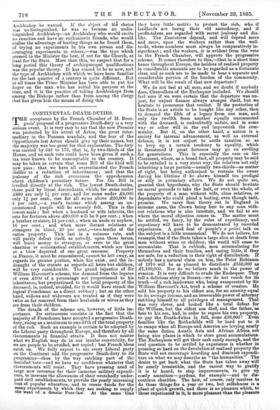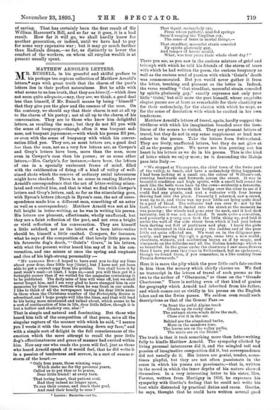CONTINENTAL DEATH-DITTIES. T HE acceptance by the French Chamber of M.
Bour- geois' proposal of a progressive Death-duty is a very serious event. It is very easy to say that the new Premier was protected by his arrest of Arton, the great inter- mediary in the Panama scandals, and the fear of the Opportunists lest Arton should give up their names, but the majority was too great for that explanation. The duty was carried by 343 to 176, that is, by two-thirds of the House, and no such vote could have been given if such a tax were known to be unacceptable to the country. It may be taken as certain that some Bill of the kind will now pass ; that we have all overestimated the French dislike to a reduction of inheritances ; and that the jealousy of the rich overcomes the apprehension about children's pecuniary future. For the Bill is levelled directly at the rich. The lowest Death-duties, those paid by lineal descendants, which, for sums under £400 are only 11 per cent., and for sums under £4,000 only 1 per cent., rise for all sums above £80,000 to 4 per cent.,—a year's income which among an un- accustomed people will be severely felt. This is the lowest scale ; but when a husband or wife inherits, the rate for fortunes above £80,000 will be 9 per cent. ; when a brother or sister, 14 per cent. ; when an uncle or nephew, 16 per cent.; and when more distant relations or strangers in blood, 20 per cent.,—two-tenths of the entire property. This last is a ruinous rate, and will partly defeat itself, as nobody, upon those terms, will leave money to strangers, or even to the great charities or ecclesiastical establishments, which are thus at a blow deprived of one great resource. Property in France, it must be remembered, cannot be left away, as regards its greater portion, when kin exist, and the in- draught of the statute as regards all heirs but children, will be very considerable. The grand injustice of Sir William Harcourt's scheme, the demand from the legatee of even £100 of a percentage not proportioned to his inheritance, but proportioned to the total property of the deceased, is, indeed, avoided, for it would have struck the logical Frenchman as a direct robbery ; but on the other hand, widows and widowers are treated as if they were twice as far removed from their husbands or wives as they are from their children.
The details of the scheme are, however, of little im- portance. Its seriousness consists in the fact that the majority of Frenchmen have accepted a progressive Death- duty, rising as a maximum to one-fifth of the total property of the rich. Such an example is certain to be adopted by the Liberal party throughout Europe, and therefore by all Governments in financial straits. It does not matter what we English may do in our insular eccentricity, for we are people to be avoided, not copied ; but French ideas catch on. We fully expect to see every Liberal party on the Continent add the progressive Death-duty to its programme—thus by the way catching part of the Socialist vote—and we have no confidence whatever that Governments will resist. They have pressing need of large new revenues for their immense military expendi- ture, to increase the allowances of their wretchedly under- paid civil establishments, to provide the yearly increasing cost of popular education, and to create funds for the many experiments by which they are seeking to supply the want of a drastic Poor-law. At the same time they have little motiva to protect the rich, who if landlords are losing their old ascendency, and if profit-takers, are regarded with secret jealousy and dis- like. The Executives depend, and will depend more and more, upon the workers rather than the well- to-do, whose numbers must always be comparatively in- significant ; and the workers, it is evident from the vote in the French Chamber, will approve the progressive scheme. It comes therefore to this,—that in a short time hence throughout Europe, the holders of realised property in considerable amounts are to be regarded as a fortunate class, and as such are to be made to bear a separate and considerable portion of the burden of the community. What will be the result of that new departure ?
We do not feel at all sure, and we doubt if anybody does, Chancellors of the Exchequer included. -We should feel sure if we were certain that the departure was un- just, for unjust finance always avenges itself, but we hesitate to pronounce that verdict. If the protection of the State is an article to be bought like any other, then to demand the fifth of a legacy from one man, and only the twelfth from another equally unconnected with the deceased, is undoubtedly unfair, and in some way or other will in the end impoverish the com- munity. But if, on the other hand, a nation is a society for internal advancement, as well as external defence, it is not unjust to settle taxation so as to keep up a certain tendency to equality, which is threatened if great fortunes may go on swelling for generations. This is especially the case on the Continent, where, as a broad fact, all property may be said to be entailed in a very strict way, the relatives not only inheriting a large portion—usually two-thirds—as matter of right, but being authorised to restrain the owner during his lifetime if be shows himself too prodigal or silly in pecuniary affairs. We do not quite see, granted that hypothesis, why the State should hesitate on moral grounds to take the half, or even the whole, of the property of a man without wife, close relatives, or dependants who could plead a lasting, even though tacit, promise. We carry that theory out in England in extreme cases, the Crown being heir to any man with- out relations who is also intestate, and we fail to see where the moral objection comes in. The matter must be settled, we fancy, by the rules of expediency, and expediency will have to be demonstrated by recorded experiences. A good deal of people's a priori talk on the subject is a little nonsensical. We do not believe, for example, that if the State takes a large slice at death from men without wives or children, the world will cease to accumulate. That is rubbish, men accumulating for themselves and their families, and caring little, if they are safe, for a reduction in their right of distribution. If nobody has a natural claim on him, the Peter Robinson of 1910 will be as pleased to distribute £550,000 as £1,100,000. Nor do we believe much in the power of evasion. It is very difficult to evade the Exchequer. They tell a delicious story in Sussex—we do not vouch for its truth—of a rich landowner who, being exasperated by Sir William Harcourt's Act, tried a scheme of evasion. He sold his property to his eldest son, for an annuity equal to its average income, and an irrevocable power of attorney entitling himself to all privileges of management. That was very clever, and looked like a total defeat for Sir William, but the eldest son died, and the father, as heir to his son, had, in order to regain his own property, to pay the Death-duties in fall, some £38,000 ! Even families like the Rothschilds will be hard put to it to escape when all Europe and America are levying nearly the same duties, Asiatic Asia and African Africa not being nice places in which to store great accumulations. The Exchequers will get their cash easily enough, and the real question to be settled by experience is whether in pressing so hard on the devolution of realised property the State will not encourage hoarding and diminish expendi- ture on what we may describe as "the humanities." The desire to get back what the State has taken away will be nearly irresistible, and the easiest way to gratify it is to hoard, to stop improvements, to give up costly amenities—gardens, for example—and to dis- continue charities. The heir, of course, only resolves to do these things for a year or two, but selfishness is a plant of quick growth, and there is no pleasure which, to those experienced in it, is more pleasant than the pleasure of saving. That has certainly been the first result of Sir William Harcourt's Bill, and so far as it goes, it is a bad result. How far it will go, we shall hardly know for another generation, or indeed, until we have had to pay for some very expensive war ; but it may go much farther than Radicals dream,—so far, as distinctly to lower the Comfort of the workers, on whom all surplus wealth is at present usually spent.











































 Previous page
Previous page